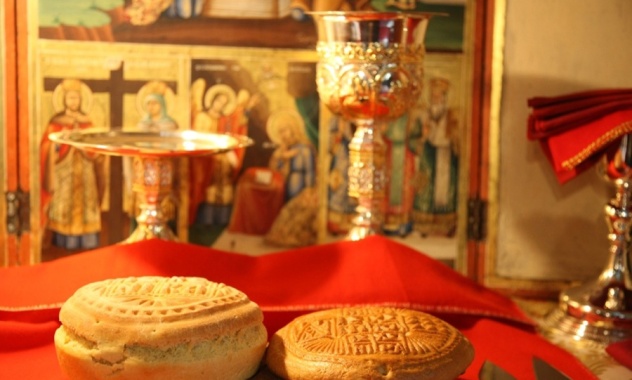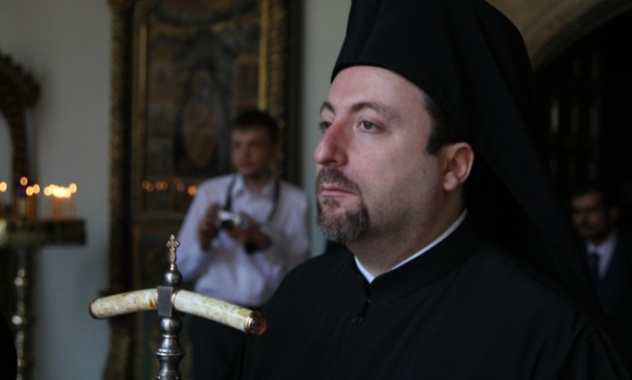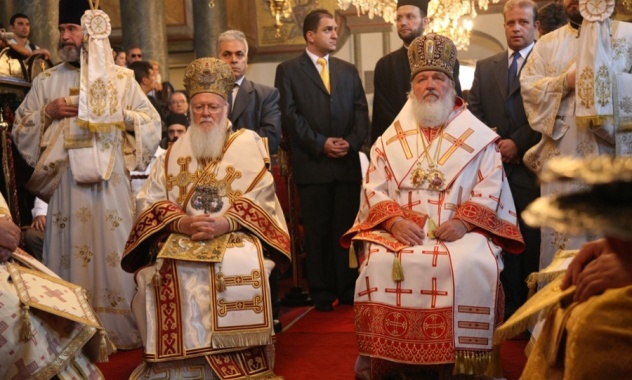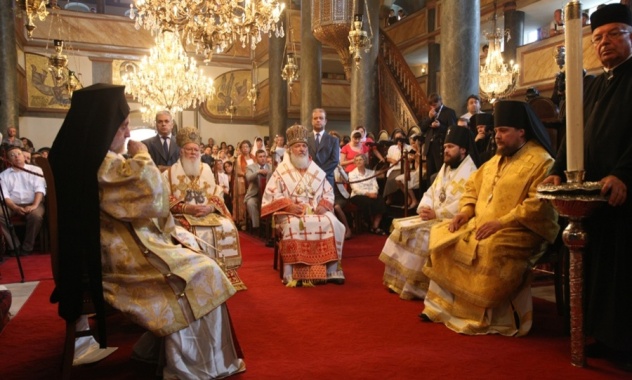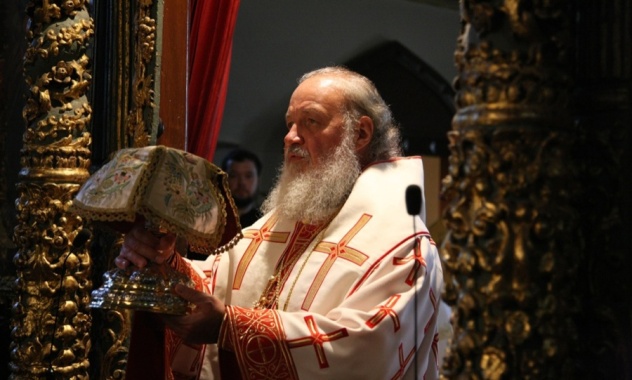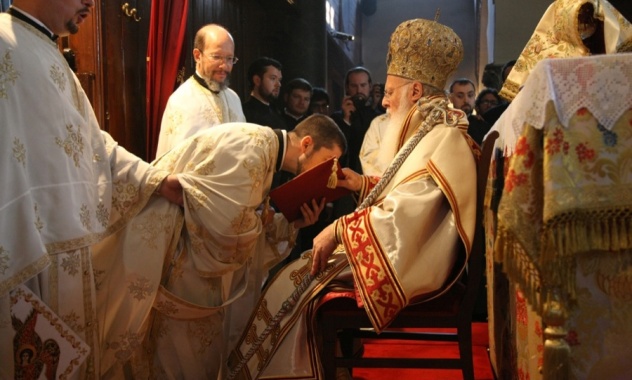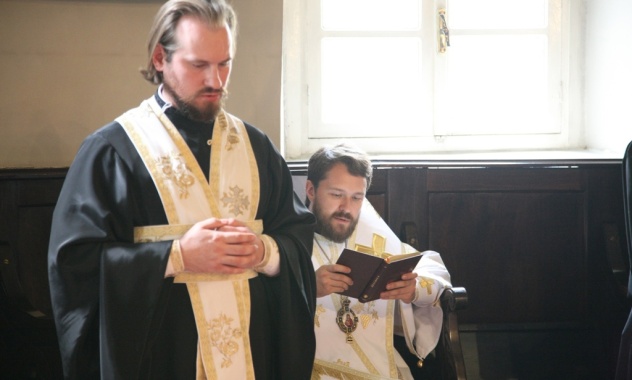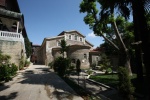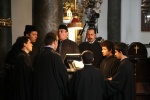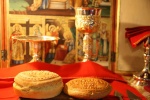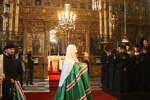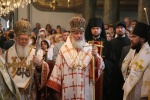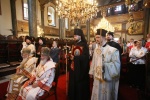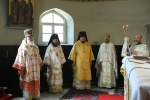Primates of the Orthodox Churches of Constantinople and Russia celebrate Divine Liturgy at the Patriarchal Cathedral of St George
On 5 July 2009, His Holiness Patriarch Bartholomew of Constantinople and His Holiness Patriarch Kirill of Moscow and All Russia celebrated Divine Liturgy at the Patriarchal Cathedral of St. George.
Concelebrating with the Patriarch were Metropolitan Michael of Austria, Metropolitan John of Pergamon (Patriarchate of Constantinople), the Chairman of the Moscow Patriarchate Department for External Church Relations Archbishop Hilarion of Volokolamsk, the head of the Moscow Patriarchate Administrative Centre Bishop Sergy of Solnechnogorsk, and clergymen of the Orthodox Churches of Constantinople and Russia.
Attending the divine service were Ambassador Extraordinary and Plenipotentiary of Russia in Turkey V. Ivanovsky, consul-general of Russia in Istanbul A. Krivenko, and consul-general of Greece in Istanbul V. Bornovis.
After the divine service His Holiness Patriarch Bartholomew of Constantinople greeted the Primate of the Russian Orthodox Church, saying: ‘It is with great joy, profound love and honour that we greet you here in the Church from which the unfading light of our holy and immaculate Orthodox faith has shown forth to the pious and blessed by God Russian people represented by Your Holiness. We greet these people and pray to the Lord for blessing them with His grace and strengthening them ‘to contend for the faith that was once for all entrusted to the saints’ (Jude 1:3).
His Holiness Patriarch Bartholomew said that His Holiness Patriarch Kirill’s visit that the Patriarchate of Constantinople considers as an event of great importance ‘has a symbolic and ecclesiological meaning’ and that the celebrated Divine Liturgy ‘is the highest expression of our unity.’
‘As we know and as the Church Fathers taught us, the Church exists and manifests herself as the Body of Christ first and foremost in the Divine Liturgy… Having celebrated it, we manifested the very Church of Christ in time and space and, having partaken of the one Bread and one Chalice, we are united in the communion of the Holy Spirit,’ he underscored and continued, ‘Nothing can take away the unity we have in the Chalice. We repeat after the Apostle that no hardship, no distress, or persecution, famine, or nakedness, peril, or sword (cf. Rom 8:35) can overcome our unity in the Body of Christ. Shadows or clouds appearing from time to time in the relations among our Churches are transitory and pass rapidly. The responsible church leaders must find solution of all problems in the spirit of peace and love in order to preserve the unity of our Holy Orthodox Church.’
His Holiness Bartholomew cited the work of the 4th Pan-Orthodox Pre-Council conference in Chambesy as an example of good cooperation between the two Patriarchates, expressed his appreciation for the constructive contribution of Russian Church delegation’ and added, ‘We exist as the Church not for our own sake, but for the sake of people and the creation, and we cannot neglect those outside the bosom of the Orthodox Church while boasting that we have found the truth’. Therefore, it is necessary to witness about Orthodoxy in the field of interchristian contacts, he emphasized.
The Primate of the Orthodox Church of Constantinople believes that many disasters of the present time, including wars, world financial crisis, and the suppression of the weal by the strong, ‘oblige the Church of Christ to say her world and with all means at her disposal to facilitate ethic sensitivity in modern society.
He said further, ‘We know that the Orthodox Church adheres to the traditions and that she cherishes the precious inheritance she has got from the past generations, such the uninterrupted succession of the saints, the great hierarchs, fathers and doctors of the Church, apostles, prophets, and martyrs whose head is our Lord Jesus Christ who ‘is the same yesterday today and forever’ (Heb 13:8). The saints – wherever they lived – are our common treasure, and the holy land of Russia has given them to our Church as a gift. They call us to follow them in their life pleasing to God and remind us that we belong to the One, Holy, Catholic and Apostolic Church, as we confess it in the Creed.’
His Holiness emphasized that ‘our adherence to traditions does not impede our life or our witness in the modern world. The Orthodox Church is attentive to the search, needs and cares of people and is prepared to heal the wounds of the suffering, as the Good Samaritan did. (cf. Lk 10:30-35). Let our Churches join hands with the others and as the one Church of Christ go the liturgy after liturgy and bring the Bread of life to people who hunger and thirst for justice and love.’
In conclusion His Holiness Patriarch Bartholomew wished the Divine Liturgy concelebrated by the Primates of the two fraternal Orthodox Churches ‘to continue as a common way to the Kingdom of God’ and presented His Holiness Patriarch Kirill with a set of panagias.
His Holiness Patriarch Kirill of Moscow and All Russia said in his speech, ‘The most important event in our visit to the Holy Church of Constantinople – the concelebration of the Divine Liturgy and partaking of the Holy Body and Blood of the Lord, our unity in the Holy Spirit took place today. Indeed, the life of the Church is focused on the Eucharist, from which it draws strength. Following the commandment of Church, we commemorate His expiatory deed and, sharing the Eucharist repast, become one body and one spirit with the Lord (cf. Eph 4:4; Cor 6:17), closely united with one another. The Saviour prayed before His death that his disciples may be one, as the Father and the Son are one (cf. Jn 17:22), and we, the followers of Church, must diligently care for preserving our unity! The concelebration of the Primates of the Local Orthodox Churches is a vivid manifestation of this unity.’
He noted that the stay in the cathedral city of the Patriarchate of Constantinople with its great shrines of Orthodoxy provokes profound feelings and said further, ‘We recollect the most important events in the history of the Church happened on this earth, such as the miraculous intercession of the Mother of God who many times protected this city from invasions. We also recollect the events linked to the Baptism of Russia.
‘I am happy to meet the living bearers of the centuries-long tradition, steadfast in their faith and loyal to the memory of their forefathers, these children of the Holy Church of Constantinople lead by their Father the Patriarch. In spite of all cataclysms in history, the name of Christ is shining in this city and in this holy church. We thank God who vouchsafed us to see the Most Holy Church of Constantinople living in peace and God’s grace, and its Primate – in good health and spiritual strength.’
His Holiness Patriarch Kirill reminded his listeners that the today’s weekly celebration of the Resurrection of Christ is combined in the calendar of the Church of Constantinople falls on the commemoration day of St Athanasius of Mt Athos. ‘One cannot help seeing a symbolic meaning of the fact that we concelebrated on the commemorations day of a pillar of the Athonite asceticism. We know that the rule of St Athanasius for the Great Laura that he founded had brought about a time of flourishing for the monks on the Holy Mountain. Fifty years after the blessed demise of St Athanasius, St Anthony who was tonsured a monk on Mt Athos returned to Russia and founded another great laura – the Laura of the Caves in Kiev, from where monastic tradition has spread throughout Russia. As on Mt Athos, the monasteries in Russia have become not only places of spiritual deeds of the monks, but also the real spiritual and educational centres. The monks copied and kept books, while the imbued with the spirit ascetics who attained perfection serve the world as experienced spiritual teachers and preachers of the Gospel of Church, as defenders of the Orthodox faith and the unity of the Church.
His Holiness Patriarch Kirill said that ‘at present the monasteries in Russia, Ukraine, Byelorussia and other countries in spiritual care of the Moscow Patriarchate preserve the faith and care for the unity of our Church.
It was through the rich monistic tradition that the Russian Church got the Liturgical Ordos from Byzantine, first of the Studion, and later of Jerusalem that is being used in the monasteries and parishes. The services to the Russian saints and other liturgical texts were written on the pattern of the Byzantine hymns. The Greek were the first teachers of the Russian iconpainters. The Old Russian church singing also experienced the influence of the Byzantine school. Russian theology is linked with the names of Sophronius and Joannicius Likhuds who founded the first theological school in Moscow – the Slavonic-Greek-Latin Academy, which gave the present Moscow Theological Academy.’
His Holiness the Patriarch underscored that ‘in all spheres of the life of the Church we see common tradition that indissolubly links the Church of Constantinople with her one Daughter, the Russian Church, which now is her sister equal in honour. Our common Tradition is a solid foundation for common witness before the modern world. When religion is ousted to the margins of social life and the very concept of sin is being erased, when traditional moral values are radically revised and the principle of gain and profit become a basis of economics, we must combine our efforts in asserting Gospel standards and in giving common Orthodox answer to the challenges of the time.’
The Primate of the Russian Orthodox Church wished all the believers of the Holy Church of Constantinople living in this city and in other cities and countries of the world ‘God’s help, spiritual strength and the peace of Christ,’ thanked His Holiness Patriarch Bartholomew ‘for generous hospitality in this blessed land’ and presented him with a set of patriarchal panagias and liturgical vessels/
”Your Holiness, please accept this presents in memory of our brotherly meeting and concelebration to remind you of today’s divine service,’ Patriarch Kirill said, and then distributed the antidoron among numerous worshippers.
The Primates of the Orthodox Churches of Constantinople and Russia blessed people who gathered in the church yard from the balcony of the Patriarchate premises.
Other events
-
06.07.2009 23:00(Russian) Завершился визит Предстоятеля Русской Православной Церкви в Константинопольский Патриархат
-
06.07.2009 19:15His Holiness Patriarch Kirill of Moscow and All Russia meets with Turkish Prime Minister Tayyip Erdogan
-
06.07.2009 09:54A long-abandoned Orthodox church consecrated at the Russian Consulate’s summer residence in Buyukdere near Istanbul
-
05.07.2009 20:49(Russian) В ходе визита Предстоятеля Русской Православной Церкви в Константинопольский Патриархат в храме святой Ирины состоялось выступление хора московского Сретенского монастыря
-
05.07.2009 12:56Primates of the Orthodox Churches of Constantinople and Russia celebrate Divine Liturgy at the Patriarchal Cathedral of St George
-
04.07.2009 23:15Talks between Patriarch Bartholomew of Constantinople and Patriarch Kirill of Moscow and All Russia
-
04.07.2009 23:13His Holiness Patriarch Kirill: Negotiations between Primates of the Orthodox Churches of Constantinople and Russia were held in a constructive spirit
-
02.07.2009 12:42(Russian) С 4 по 6 июля состоится визит Святейшего Патриарха Московского и всея Руси Кирилла в Константинопольский Патриархат









